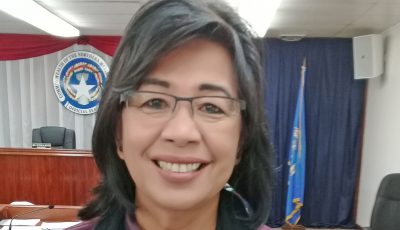AG: Pot bill does not follow process
A proposed bill to regulate the use of marijuana in the CNMI would first have to hurdle the Legislature. It would then go to the governor. If Gov. Ralph DLG Torres signs it, it will then be presented to voters for voting at the next election.
That’s not according to how a bill becomes law, said Attorney General Edward Manibusan, who raised a concern that the bill does not follow the “standard legislative process.”
In a letter dated Oct. 25, 2017, Manibusan said that all but one section of Sen. Sixto K. Igisomar’s (R-Saipan) Senate Bill 20-62 SD1 “passes constitutional muster.”
One portion that raised a red flag for Manibusan was a section in the bill that does not allow S.B. 20-62 SD1 to become a law after being signed by Gov. Ralph DLG Torres. That alone is a “novel and likely illegal” approach to how the bill becomes law upon its passage, he said.
He was quick to point out, though, that the Office of the Attorney General “neither takes a position” on the regulation and legalization of cannabis.
The way S.B. 20-62 SD1 is written as of publication is that even if the law passes the House of Representatives and gains the approval of the governor, the law then is inserted into the ballots for the 2018 general elections for the public to vote on.
The bill further divides the legalization and regulation of cannabis per island. It would only apply to islands where the bill obtains a simple majority of votes during the 2018 elections. Simple majority means more than 50 percent of votes approving the passage of the bill. In places where a simple majority vote is not obtained, the bill would not apply and cannabis use would remain illegal. That could potentially mean that cannabis use would be allowed on Saipan but not on Tinian.
In his comments on the bill, Manibusan said the ballot measure would not include “the full text of the bill, but simply the question, ‘should the Commonwealth legalize and regulate marijuana by approving the CNMI Cannabis Act of 2018?’”
“This process is inconstant with the Commonwealth Constitution,” Manibusan said, adding that this section of S.B. 20-62 SD1 only allows a simple majority of the voters to approve the question for the bill to become law. Initiatives usually require two-thirds majority of yes voters.
A bill becomes law either through the regular legislative process or an initiative. The former, which is the usual process, is the faster way to pass bills into law. This process requires one chamber of the Legislature to draft a bill, deliberate on the bill, and then act on the bill before it goes to the other chamber of the Legislature. The other chamber goes through the same process and if passed, goes to the governor for enactment.
The initiative, on the other hand, starts with a petition that must be brought to and approved by the attorney general and should be signed by at least 20 percent of people qualified to vote in the Commonwealth before the entire bill is placed on the ballot. If the initiative garners at least two-thirds of the majority that votes for its passage, the bill then becomes law.
“…SB 20-62 follows neither the standard legislative process nor the constitutionally prescribed voter initiative method. The bill either inhibits the constitutionally mandated review of the law by the governor, or it does not follow the proper procedure, ballot language, and number of votes to pass as an initiative. As such, [the section pertaining to the bill’s passage] needs to be removed or amended,” said Manibusan.
His letter was submitted to Senate Committee on Judiciary, Government, and Law chair Sen. Steve K. Mesngon (R-Rota).



























